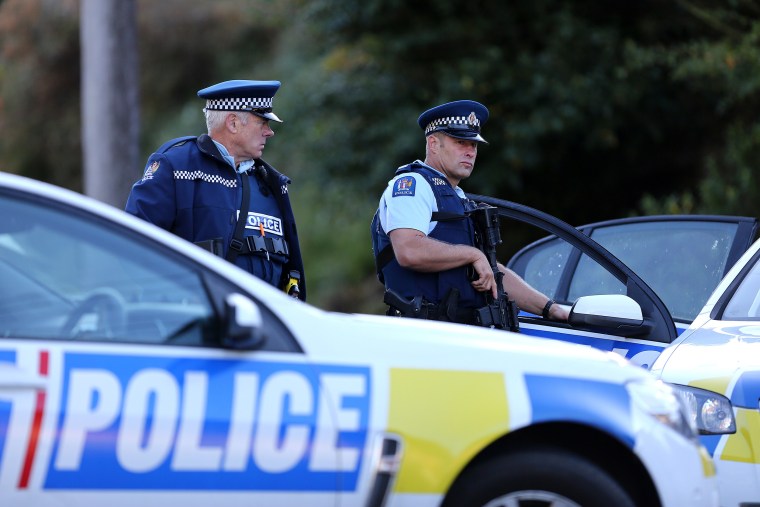New Zealand Prime Minister Jacinda Ardern on Saturday said “our gun laws will change” after a mass shooting at two mosques in the city of Christchurch killed 49 people and wounded dozens more Friday.
Ardern said at a news conference that she was advised that the gunman had five firearms — two semi-automatic weapons, two shotguns and a lever-action firearm — and that he had acquired a gun license in November 2017.
"While work is being done as to the chain of events that led to both the holding of this gun license and the possession of these weapons, I can tell you one thing right now: Our gun laws will change," Ardern said.
She noted that there have been attempts to change the nation's gun laws in the past, most recently in 2017, but said "now is the time for change." She suggested she was looking at the issues around ownership of semi-automatic weapons.
One man, an Australian citizen, has been arrested and charged with murder in the attacks that authorities have called an unprecedented act of violence.
New Zealand police said the 28-year-old man appeared in Christchurch District Court on Saturday morning. Two U.S. officials briefed on the investigation have confirmed the suspect is Brenton Tarrant.
"While the man is currently facing only one charge, further charges will be laid," police tweeted. He was remanded without plea until his next appearance in the High Court on April 5, Reuters reported.
He had a gun license that allowed him to legally purchase the guns, Ardern said.
"As soon as New Zealanders hear that someone was legally able to acquire, as I'm advised, those weapons and carry out this event, that will raise enormous questions with our gun laws, and that is why we will respond swiftly," Ardern said.
She said a ban on semi-automatic weapons was "certainly one of the issues that I’m looking at with immediate effect."
"I've asked for advice yesterday on all of these questions,” she said.
Two other people were arrested, and “inquiries are ongoing to establish whether the other two who were arrested were directly involved with this incident,” Ardern said.
None of those apprehended had a criminal history in New Zealand or Australia, and they were not on watch lists in either country, she said.

Officers responded to reports of shots fired Friday afternoon. The two mosques are about three miles apart, and the second mosque was attacked about 45 minutes after the first.
Ardern said the Australian citizen charged with murder had traveled the world and had “sporadically” been in and out of New Zealand. She said agencies would be piecing together his travel and the sequence of events that led to him getting a gun license.
The prime minister said that the man got the license in November 2017 and began purchasing the guns the following month.
He has been described by officials as a "right-wing extremist terrorist," and appeared to post a lengthy manifesto before the attack detailing his white-supremacist worldview.
Australia bought back firearms and tightened rules on gun ownership in 1996 after a mass shooting in which 35 people were killed and 23 injured at a cafe in Port Arthur, Tasmania.
Asked whether she supported a similar buy-back program, Ardern said it was too early to say.
New Zealand Police Commissioner Mike Bush said Saturday afternoon that "I was very happy to hear the prime minister's comments this morning that there will be a change in the gun law, but I can't say any more than that."
A fourth person taken into custody after Friday's shootings in Christchurch "was a member of the public who was in possession of a firearm, but with the intention of assisting police," Ardern said. That person has been released.
Forty-nine people were killed in the attack: 41 died at one mosque, seven at another and one person has since died in hospital, Ardern said.
Dozens were injured. By Saturday afternoon, Christchurch Hospital still had 39 injured patients, including 11 patients considered critically ill in the intensive care unit, according to Greg Robertson, chief of surgery. A 4-year-old was transported to a hospital in Auckland in a critical condition, he said.
Most of those admitted were men between 30 and 40 years old, but those in the hospital also include two boys, aged 2 and 13, who are considered stable, he said.
Injuries ranged from relatively superficial to injuries to the head, abdomen and chest. Many will require multiple treatments to deal with their complex injuries, he said.
"Clearly, we are worried about a number of the patients by calling them critically ill," said Robertson.
Christchurch Mayor Lianne Dalziel said Saturday that the city was doing all it could to provide support for the victims' families, including helping with funeral arrangements and places for their loved ones to be buried.
“We are talking about people in this city who have lived here for years and years and years,” she said. "They are our friends, they are our neighbors. We embrace them at this time."
She said of the suspected killer: “His was the voice of hate, and the only way that communities can respond to the voice of hate is to come together in love, compassion and kindness."
